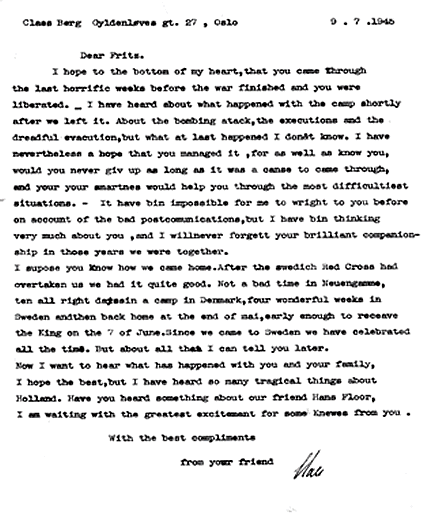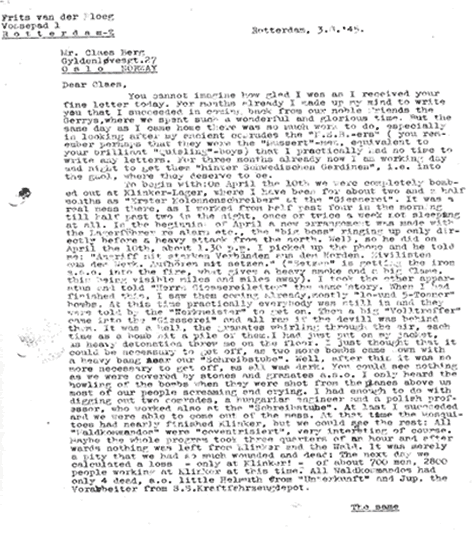



Everyone who has read anything at all about the Second World War knows that most Scandinavian prisoners in German concentration camps were spared the horrors of the final days by the ‘White Buses’. From the pens of some of those who remained behind, we know what those horrors were. We could quote from any one of many books but instead we have a unique, unpublished report that recently came into our hands because of our story about ‘Claes’.
After 2 years in Sachsenhausen, Claes came home to Norway at the end of May and started to pick up the threads of his old life. He tried to forget the horrors of the camp but he couldn’t forget the friends he had left behind when the White Buses rescued him – just weeks before the Russians arrived.
On July 9 1945 he wrote to one of these men:
Dear Frits.
I hope from the bottom of my heart, that you came through the last horrific weeks before the war finished and you were liberated. I have heard about what happened with the camp shortly after we left it. About the bombing attack, the executions and the dreadful evacuation, but what at last happened I don’t know. I have nevertheless a hope that you managed it, for I know you would never give up as long as there was a cause to come through, and your smartness would help you through the most difficult situations.
It has been impossible for me to write to you before on account of the bad post communications, but I have been thinking about you very much, and I will never forget your brilliant companionship in those years we were together.
I suppose you know how we came home. After the Swedish Red Cross had taken us over we had it quite good. Not a bad time in Neuengamme, then all right for a few days in a camp in Denmark, four wonderful weeks in Sweden and then back home at the end of May, early enough to receive the King on the 7th of June. Since we came to Sweden we have celebrated all the time. But about all that I can tell you later.
Now I want to hear what has happened to you and your family. I hope the best, but I have heard so many tragic things about Holland. Have you heard anything about our friend Hans Floor.
I am waiting with the greatest excitement for some news from you.
With the best compliments, from your friend,
Claes.
On August 3 1945 Frits replied:
Dear Claes,
You cannot imagine how glad I was to receive your fine letter today. Months ago I made up my mind to write you that I succeeded in coming back from our noble friends the Jerries, where we spent such a wonderful and glorious time. But there was so much work to do, especially in looking after my ancient comrades the “F.S.B.’ ers.”(Equivalent to your brilliant “Quisling” – boys), that I practically had no time to write any letters. For three months now I have been working night and day to get them into jail where they deserve to be.
To begin with: On April the 10th we were completely bombed out at the Klinker-camp, where I have been for about two and a half months as “Erster Kolonnenschreiber” at the “Giesserei” (foundry). It was a real mess there, as I worked from half past four in the morning till half past two in the night, once or twice a week not sleeping at all. In the beginning of April a new arrangement was made with the camp leader regarding the alarm: the ‘big boss’ ringing up only directly before a heavy attack from the north. Well, so he did on April the 10th, about 1.30 pm. I picked up the phone and he told me “Angriff mit sterken Verbanden aus dem Norden. Sivilisten aus den Werk. Aufhören mit setzen.” (Attack with strong units from the north. Civilians out of the works. Discontinue ‘setzen’ Setzen is getting the iron ore into the furnace, which makes heavy smoke and a big flame, this being visible miles and miles away.) I took the other telephone and told ‘Mr Foundry Boss’ the same story.
When I had finished this, I saw them coming already, mostly ’10 and 5 ton’ bombs. At this time practically everybody was still inside they were told by the foreman to get out. Then a big direct hit came into the ‘foundry’ and all ran as if the Devil was behind them. It was a hell, the shrapnel whirling through the air, each time a bomb hit. I had just put on my jacket as a heavy detonation threw me on the floor. I just thought that it was necessary to get out, as two more bombs came down with a heavy bang near our office. Well, after this it was not possible to get out as all was dark. You could see nothing as we were covered by stones and shrapnel. I only heard the howling of the bombs when they fell from the planes above us, most of our people screaming and crying. I had enough to do with digging out two comrades, a Hungarian engineer and a Polish professor, who worked also at the office. At last I succeeded and we were able to come out of the mess. At that time the Mosquitoes had nearly finished ‘Klinker’, but we could see the rest: the ‘Wald’-camps were ‘Coventry-ized 1 , very interesting of course. Maybe the whole process took three quarters of an hour and afterwards nothing was left from Klinker to the forest. It was merely a pity that we had so many wounded and dead. The next day we calculated a loss – only at Klinker – of about 700 men of 2800 people working there at this time. The ‘Wald’-camps had only 4 dead – little Helmuth was one, Jup another.
The same evening we went to the ‘Main Camp’, after having picked up the wounded as far as possible – which was forbidden by the foreman who on the contrary, asked for volunteers to save some big heaps of coal, which were aflame. Of course he did not get a single volunteer. In Sachsenhausen we were – during the night – all searched for propaganda leaflets, weapons, gin, etc. Leaflets they didn’t find, though the next day everyone in the camp had read them. But what was worse – and this is not fantasy, as I myself have seen it! – several Ukranians and Russians had some half-burnt leg or arm hidden under their jacket. This as an example, how hungry we were the last days. And the last days, till the 21st when we left the camp, were still worse, as in general nobody had more to eat than his 20 grams of bread and a litre of very watery soup.
The 20th of April – Adolf’s birthday! – saw us all together in the camp as all work parties were strictly forbidden to leave. The Russians were already in the vicinity. And of course our gentle protectors on the other side of the electric wire got some present from the Allies, as there was a heavy bombing-attack, the heaviest that ever Oranienburg got.
The next day all the Polish and Czech people were called together, already in the early morning. All got a loaf, some butter and meat. In the afternoon they started for the direction of Wittstock on the river Elbe. Then came the French, the Belgians, later on Yugoslavs and some Hungarians. It was said that the Dutchmen, the Russians and Ukranians had to stay till the Russians came to take over our camp. Nevertheless, at about 9.30 the whole camp was awakened hastily. They took 500 prisoners (nationality or sex did not matter – you know perhaps that at this time we had some thousands of women too in the camp and I don’t like to discuss the results of that now) each time, 500 people together with 70 SS-guards and 3 or 4 lower group leaders with MP’s about 100 metres behind.
So the whole camp – we were at that time still about 40,000 men and women – were marching into the direction northwest. Our group of 500 went off at 10.30 in the evening. Only the sick people were left (2000 men and 1000 women) and a special demolition squad was left to blow up the crematorium, the gas chambers, and the hospital. Fortunately they succeeded only in blowing up the crematorium with the gas chambers and then had to stop as the Russians were already knocking at the door (at 11.30). For those who stayed in the camp it must have been a wonderful theatre at this time, as about 16 or 18 SS were hanged just in front of the watch-tower. Then the Russians had to withdraw and commandant Böhm, the cold fanatical you know probably, who was responsible for the execution of the sick people from the beginning of February, escaped and passed us the next morning.
Well Claes, you know too well, how all those who could not march were handled: I have been marching a week, nearly 300 kilometres, getting only some potato peelings which we had to organise ourselves. During that week I have seen about eight thousand people lying along the road, shot through the head, children and women as well. Never in my whole life will I forget this nor will I forget that after my escape some 2500 people were driven together in a forest and all shot.
I don’t like to let you wait too long for an answer to your letter, Claes and therefore I will stop now, as I am very busy and I suppose it will last some days again before I can continue. (I’m going to marry in a week or two and there’s very much to do of course.) The examiner takes also some three weeks in passing our letters.
I’m very glad you are all well at home. My compliments to your family, to Per Lindh, Hans Dahlbye, Oscar Lyseng., Frans (did you hear already from Boris who went to Natzweiler? Up to now I did not succeed in getting Hans Flohr’s address, but probably I can write you more in a week or so.) and all the others.
Your friend
Frits
1 Totally destroyed – as the English town Coventry

